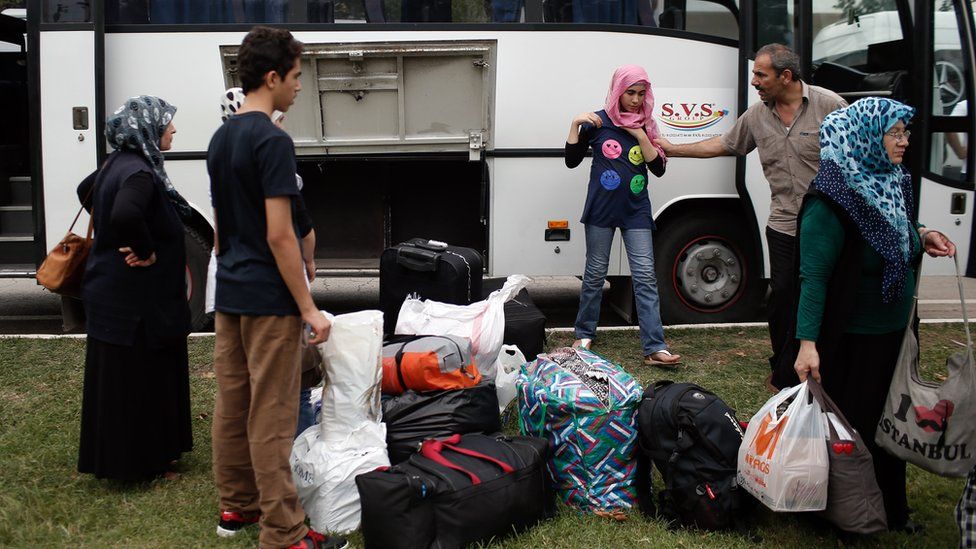Syrians in Turkey: 'We just want a normal life'
- Published

"You know what?" says the young Syrian woman, "I didn't unpack my luggage until three months ago. I thought I could go back to Syria at any point. I wanted to be ready. But I lost hope."
She was living in Homs with her family when the civil war in Syria broke out.
Initially they thought they were leaving home for only two weeks. But it has been over four years since then. They now live in Turkey's biggest city, Istanbul.
Since the crisis in Syria started in March 2011, more than four million Syrians have fled their country. More than half now live in Turkey, now the country with the biggest refugee population worldwide.
The young woman's sister is no longer there. She disappeared with her two children two months ago. For two days, the family heard nothing but then they received a call from Greece.
"It was my sister. She said they were all fine. 'We didn't drown in the sea, we didn't get killed', she said."
Every day as many as 5,000 Syrians travel across the Aegean Sea, from Turkey to Greece, on small boats that are vulnerable to rough seas.
More than 550,000 people have crossed the Mediterranean into Europe this year already, according to the UN. Three thousand have lost their lives on the journey.
Shifting attitudes
The Syrian woman tells me her sister is now in Germany, but fears for her future.
"We see on the news what sort of things the Syrians go through on their way to Europe. And what's next for them? Europe is welcoming the refugees now. But for how long? They will get tired of us. Just like the Turks did."
Migration expert Murat Erdogan says Turks have been very welcoming towards the Syrians until now, but warns attitudes are in danger of shifting.
"Two million refugees have come to Turkey and life continues as if no such thing has happened.
"People only complain about Syrian beggars on the street. But they are not aware that there are over 400,000 Syrians in Istanbul alone," he says.
Turkey has been implementing an open-door policy towards Syrians since the uprising began in their home country.
To accommodate the influx, it has built more than 20 refugee camps where Syrians have free access to basic services such as health and education.
But almost 90% do not live in the camps but in Turkey's cities, and there are concerns for their future.
Exploitation
They are not granted refugee status, as legally they are seen as guests under a temporary protection regime provided by the Geneva Convention.
According to Murat Erdogan, they therefore have no legal rights whatsoever.
They are not granted a work permit unless they have entered Turkey legally and do not receive financial aid, which makes them vulnerable to exploitation.
One young Syrian tells me he worked in a textile factory for more than a month and was not paid a penny. He had to sleep on the streets for months, he says.
Shahaf, a woman in her fifties, says her 52-year-old husband worked as a porter for four months and in the end was told he was not up to the job. He received only a month's salary for his work, she says.
The lack of legal work permits makes exploitation of Syrians very common, says Gizem al-Kadah of the Istanbul-based Association for Solidarity with Asylum Seekers and Migrants.
"Many Syrians work for 13-14 hours a day and get half of the minimum wage. Many don't even get that. Doctors and teachers are forced to sell water in street markets," she says.
According to Bill Frelick of Human Rights Watch, another major challenge for Turkey is to ensure that the many thousands of Syrian children here do not become a lost generation.
Although they have free access to Turkish schools, they are Arabic speakers and the language barrier makes it hard to keep up.
It is estimated that only one in five Syrian children in Turkey goes to school.
Schools have been set up that have lessons in Arabic and follow the Syrian curriculum, but experts warn this might not be helpful in the long run for the integration of the children.
And as well as all the social reasons that Syrians have for leaving Turkey, Bill Frelick believes internal Turkish politics also plays a part.
Recent clashes between Turkish forces and Kurdish militants have left Syrians feeling unsafe, as has the government's plan to set up a "safe zone" in the north of Syria.
"Srebrenica (during the Bosnian war) was declared a safe zone by the UN Security Council and that ended with displaced people in the zone being massacred," says Mr Frelick.
Another Syrian woman I met, called Lina, said she did not want to go to Europe but feared she would be forced to.
"We don't have work permits, we don't want anyone to give us food or money. We just want a normal life. But it's not happening," she said.
For that reason, she sees escaping to Europe as the only remaining option. "Why else would people throw themselves into the sea and get killed?"